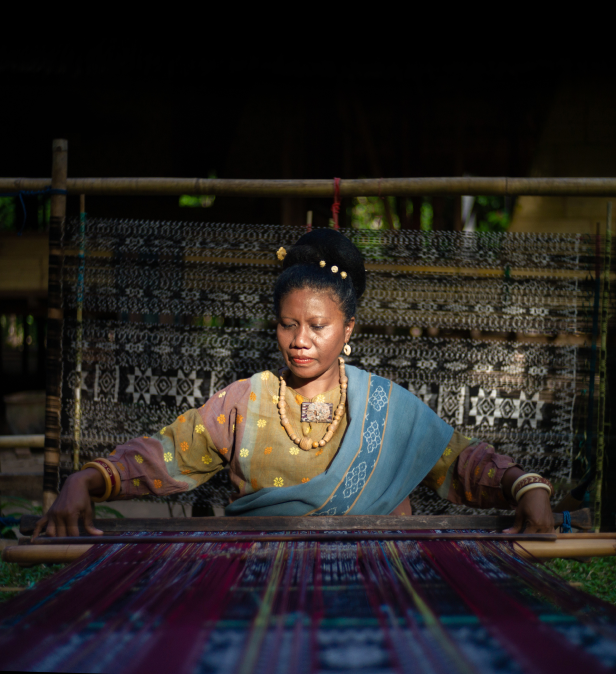
Photo Essay
Finding purpose through Ikat weaving
On the island of Flores, women are encouraged to ditch their day jobs and follow their calling.
Lepo Lorun (meaning “weaving house” in Sikka) was set up in 2002 by master weaver Alfonsa Horeng. What began as a handful of local women coming together to preserve the heritage and tradition of Ikat weaving, has grown into a social enterprise of over 800 women weavers across 17 villages on the island of Flores.
While preservation of tradition, knowledge and culture is central to the mission, there is also a deep social motive at the heart of this co-operative, which seeks to empower its members and enhance their standing in the community. Lepo Lorun encourages highly skilled weavers to leave their menial day jobs by offering time and space for them to deepen their skills in weaving. Horeng describes the loss of identity these brilliantly skilled women can experience when they are reliant on their husbands to survive. ‘If these women are working at a club or restaurant all day and then going home to complete domestic duties, they are not getting time for themselves or weaving. Here they begin to meet their own needs’.
There is a strong sense of belonging and community that is fostered among Lepo Lorun’s weavers. Sama-sama or socialisasi (socialisation) is key; bringing the women together to socialise, collaborate and work together.
The ikat process is incredibly challenging, which means music, singing, dancing and cackles of hysterical laughter have become an unofficial (but essential) part of the process.
Cotton is picked and flattened to make a ball of yarn, which is threaded around a frame to fit the motif design. Every ikat cloth is a unique design that represents aspects of a weavers life.
The word ikat, means to 'tie' or 'bind' in the Indonesian language. Ikat is the traditional hand-woven cloth that requires lots of patience, lots of dedication and even more skill to create. ‘This is an ancient art, we’re talking about hundreds of years of tradition’.
There’s an unwritten science behind Ikat weaving that is passed down from one generation to another: from how dye is processed, to making patterns and how the body is positioned.'We are not craftspeople; we are not menial workers. We are "profesoras" (professors of their pieces). The cloth is our heritage'.
Women at Lepo Lorun have spoken of a sense of fulfilment that comes from weaving and being able to provide for their families when they previously could not.
Every piece of tenun ikat, or tie-dyed and woven fabric, holds deep philosophical values, reflecting one’s life journey from birth to death.
Not all of the weavers have husbands, and Elisabeth Pagan, 53, wouldn’t have it any other way. ‘It’s better to work with the pigs, chickens and plants and to spend time weaving than to cook for a husband’, she explains, to howls of laughter. ‘I love coming here to weave with my friends’.
Because of the intricacy of the technique, it takes months for a weaver to complete her work.
Horeng concedes there was initially reluctance among some women to branch out into the unknown of becoming a full-time weaver, but they eventually felt the benefits that came with the economic empowerment Lepo Lorun provided. ‘Our weavers brought money into their families, which led to a sense of fulfilment and enhanced status in the community’.
Alfonsa is committed to using only organic local materials with natural dying and spun cotton techniques in backstrap looms. She sources the natural dye from plants such as indigofera, morinda, simplocos, turmeric, mango trees, mangrove and redwood.
There are 3 traditional colours; Indigo, Morinda and Yellow. The colours are made with a mixture of plants, barks, leaves and water. Threads are dipped up to 10 times in the dye bath before being left out to dry.
